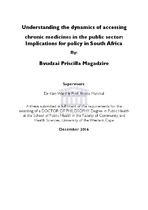| dc.description.abstract | Access to medicines (ATM), specifically for those medicines that are related to the priority
health needs of a population has been cited as a fundamental part of universal health coverage
and a key element for service delivery and high-quality care. Therefore, ensuring reliable
access to and appropriate use of safe, effective and affordable medicines is one of the core
functions of an effective health system. With the rising demand for treatment of chronic
diseases (e.g. HIV, diabetes and hypertension), ATM has increasingly received global
attention. Yet as of 2011, it was estimated that at least one third of the world's population had
no regular access to medicines. Globally, there is a dearth of in-depth country level evidence
to influence policy responses, coupled with inadequate understanding of how pharmaceutical
systems operate within broader health systems. This thesis comprises two main parts: 1) a
situational analysis of the state of chronic medicines provision in the public sector in the
Eastern Cape and Western Cape provinces of South Africa; and (2) an evaluation of an
existing ATM model in one province.
To situate this study within the ATM discourse, a conceptual framework was developed from
a review of empirical and theoretical literature. The framework incorporated six ATM
dimensions (availability, affordability, acceptability, accessibility, accommodation and
quality) and their interplay at multiple levels including: health facility, individual, household
and community levels. Then, at a health system level, the interaction of medicines (a health
system building block) with other building blocks (information, financing, human resources,
infrastructure and governance). | |

